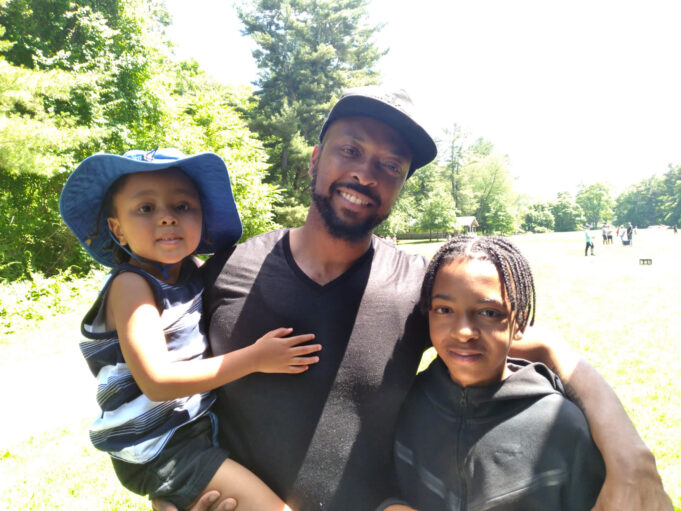There is a long history of pathologizing Black men and Black fathers in the United States. They have been historically castigated as absent, lazy, abnormal, and aberrant.
But CDC researchers found that Black fathers—whether they lived with their children or not—were more actively involved in their children’s lives than their counterparts of other races.
The report also found Black fathers who don’t live with their children are more likely to read to their kids, help them with homework, talk to them about their days, and take them to activities than Hispanic or White dads who live apart from their children.
The non-residential Black father was also the least likely to report that he does not participate in the care of his children, including bathing, dressing, changing diapers, and playing with his children, said the CDC, which released the report in 2013.
The problem is not just a negative narrative about Black fathers, but policies that have hurt them.
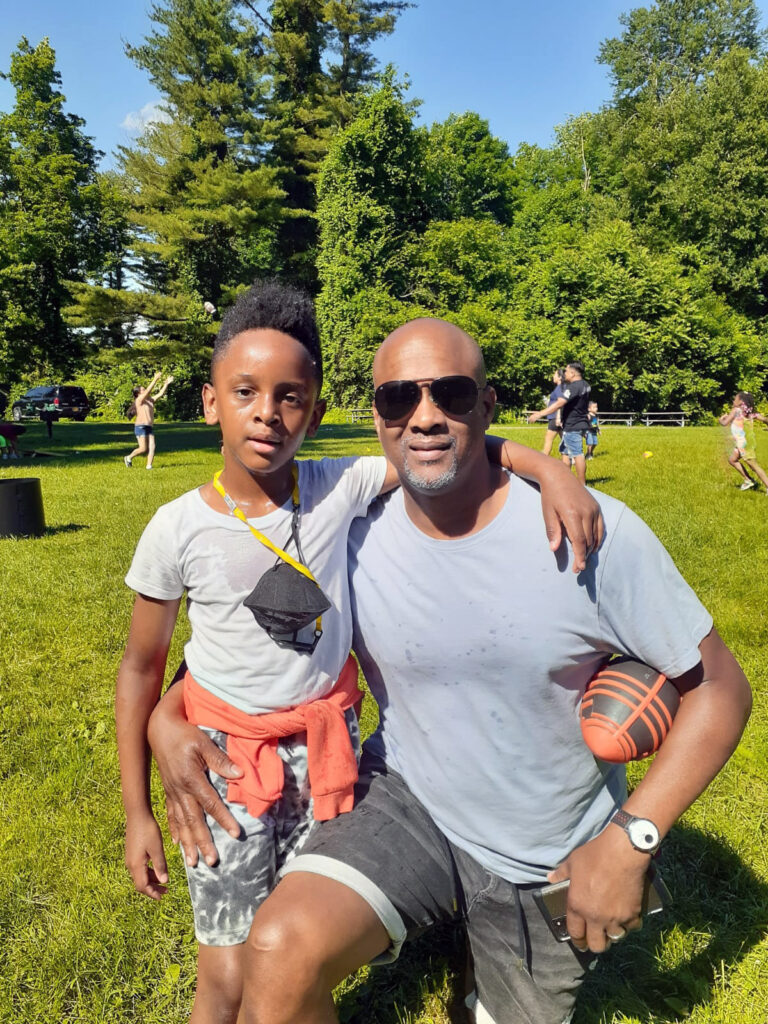
“According to the Center for Law and Social Policy, today, mass incarceration policies, barriers in the child welfare system, and economic inequality resulting in higher levels of unemployment are a few of the main structural barriers that disproportionately harm Black families,” observed researcher Jahdziah St. Julien in her study, “New America: A Portrait of Caring Black Men.”
“Yet, despite them, Black men are engaged in their children’s lives as fathers, as demonstrated by existing research and as shown in this report,” she wrote. The study was published last year.
The study also found, “Black fathers are more likely than White fathers to think that it’s essential that dads are active in raising younger children by way of feeding them, dressing them, and providing childcare.”
“A majority of Black fathers are highly involved in caring for and raising their young children daily,” it added, echoing the findings of the earlier CDC report.
Antonio Celester is the founder and program director of the Academy of African American Fathers. It was started in Boston in 1994 but is now based in Atlanta.
His organization offers a culturally-based father training program designed to counteract the challenges low-income Black fathers face. The aim is to have the fathers acquire skills that lead to better lives and stronger families.
His academy connects with Black fathers throughout the United States via an online curriculum with seven core concepts. These “Self Actualizations” help fathers become more productive and involved with their children, he said.
“What we do best is teach our fathers about traps and pitfalls as well as understanding the system they must work within,” Mr. Celester explained. “For example, child support is a civil contract. But it is, in fact, a criminal contract because failure to pay will land you in jail. Having meager salaries and half of that taken as child support is discouraging for them.
“The negative feedback loop is tough to escape. They stop working and become too embarrassed to see their children. These are the issues we deal with,” he said.
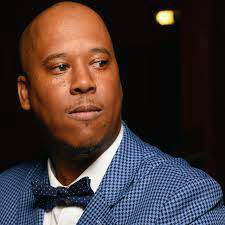
“My approach is self-actualization based on a circular concept in which we assist the individual in building themselves, discovering their stresses and their underlying weaknesses, allowing them to live with the things they cannot change and changing those things that they can.”
From slavery and segregation to social service requirements that banned fathers from homes in exchange for government assistance, over policing and incarceration, the removal of the Black man as the natural protector of his wife and family was an essential part of the oppression of Black people, say activists, scholars and advocates.
Andrew Muhammad works on the development of Black men and boys in several ways. Based in Baltimore, he heads a non-profit organization, We Our Us, which uses the perspective and power of collective action to help young men and boys achieve their goals.
He is also the student Fruit of Islam captain for the Nation of Islam mosque in the city. His work is about training men and boys and dealing with problems they face. Curbing violence is one of the areas he focuses on as a threat to Black men, Black boys and the Black community.
“We identified the violent areas based on zip code and data, and we provide resources directly to the families, to the brothers on those streets,” he explained. In 2020, Mr. Muhammad was named Peacemaker of the Year by the Baltimore Community Mediation Center.
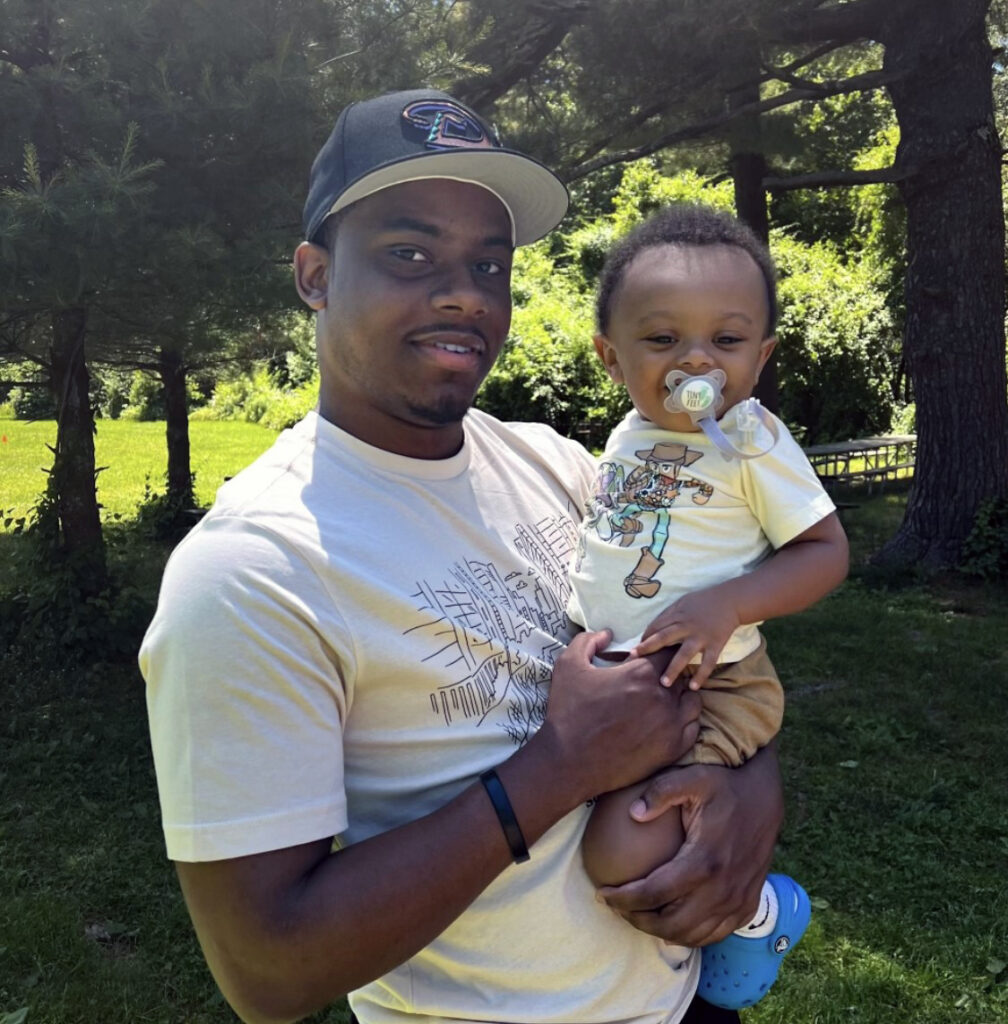
whether they lived with their children or not—
were more actively involved in their children’s
lives than their counterparts of other races.
Photo: Courtesy of Real Dads Network
In addition to helping and healing men, another focus is building strong boys and guiding both away from street life.
“In our youth mentoring program, we provide life skills and information about navigating the city’s violence to the young men and their fathers,” said Mr. Muhammad.
“Our numbers are solid, and we have been very consistent. Currently, we average interacting with 50 young men and 30 to 100 fathers weekly.”
In his experience, Mr. Muhammad says he has found one thing to be true: Black men do not want to be away from their children and the mothers of their children.
“Most Black men do not want to be absent from their families. The absent ones do not want to be absent. But because of the circumstances and conditions that have been created to make it difficult for Black men to be responsive and productive members of society, it is difficult for me to be in my son’s or daughter’s life in America,” he explained.
Black boys also need to see good examples of Black fatherhood and manhood, Mr. Muhammad stressed. “If you don’t know what a father or a man looks like, you will never win that argument,” he said.
In the Fruit of Islam and manhood training classes men and boys are taught a variety of skills and exposed to lessons on spirituality, self-improvement, entrepreneurship, self-defense, health, service and brotherhood.
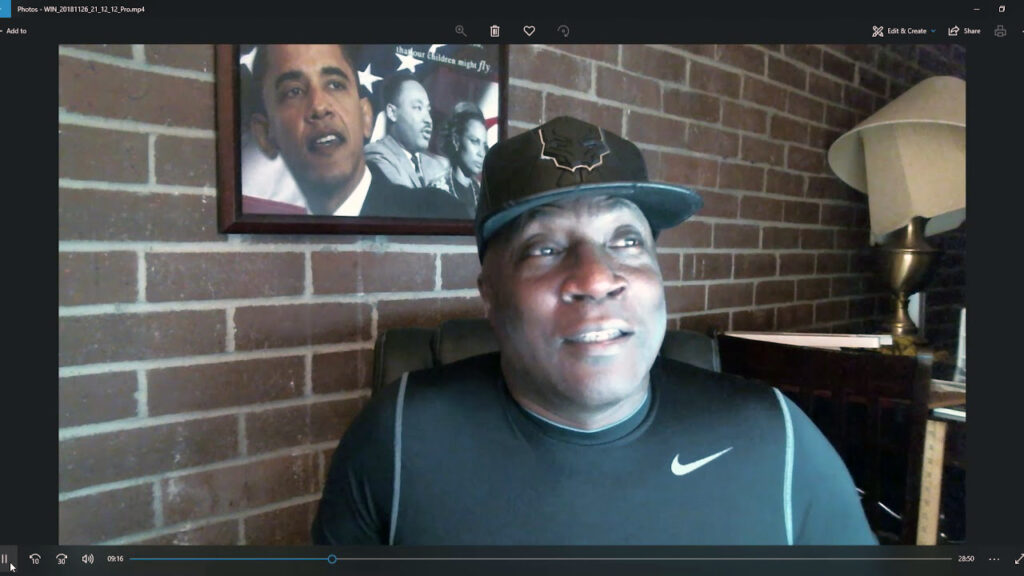
“What’s hurting us in our community is the lack of trust and guidance for young men. Often, we are too late in getting young men into these programs,” Mr. Muhammad argued.
“There are also not enough programs in the communities where these young brothers grow up and hustle. When children are three and four or five years old, we should have many different programs located in recreation centers throughout the community.
“A place where they can feel safe while being taught the basics of manhood. That’s what we do. Drop that son off with us, and he’ll get all the training he needs to become a man. It’s a win-win.”
Derek Phillips and the Real Dads Network out of New York City celebrate Black fatherhood.
His program motto is “Making Connections One Dad at a Time.” “The Real Dads Network is the outgrowth of the award-winning documentary ‘Real Dads—Black Men on Fatherhood’ which included commentary by the late great Ossie Davis and was directed by myself and Nikki Dees.”
The purpose of the 2000 documentary was to show positive Black fathers actively involved in nurturing and raising their children, he explained.
“It was the first documentary ever done that focused on positive Black fathers,” Mr. Phillips said.
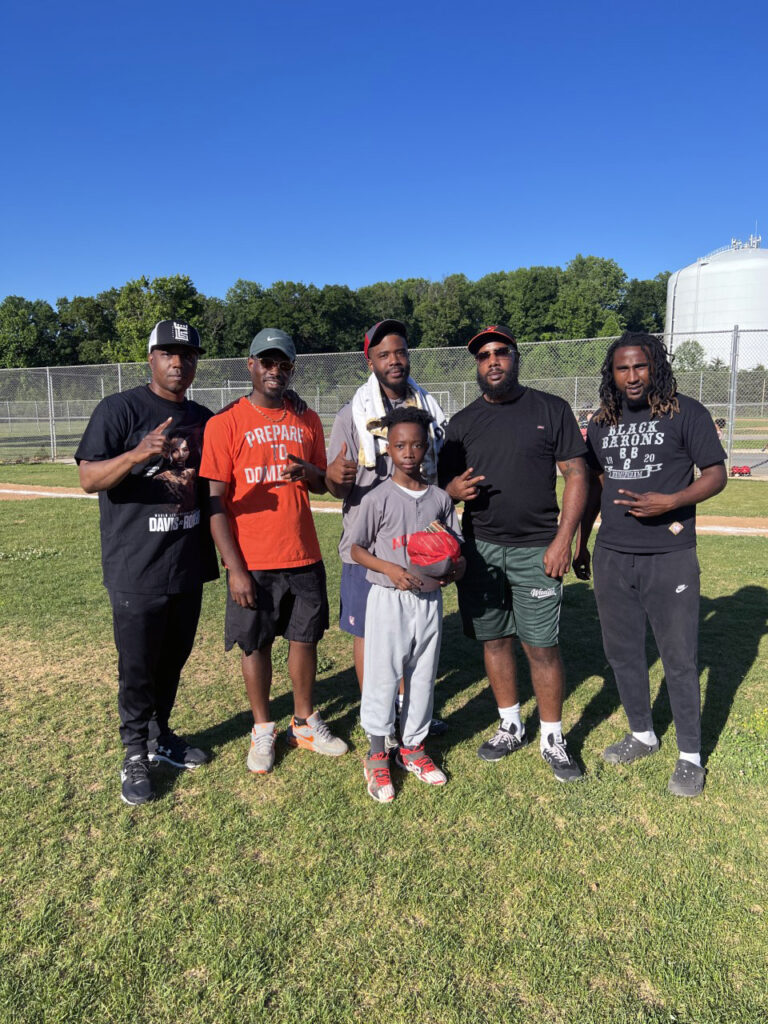
According to Mr. Phillips, feedback from the documentary revealed a strong need for an organization where fathers could:
• tell their stories and share their experiences;
• get information about being better fathers;
• have honest conversations about manhood, fatherhood, and family; and
• feel connected to something positive and empowering.
Mr. Phillips spoke to The Final Call during his program’s “Real Dads Week,” held June 4-11 this year. “It acknowledges and recognizes fathers and father figures who are exemplary role models and play such a vital role in the success of children,” he explained.
And, he added, over 260 awards have been given out since 2008 when it was called Black Father’s Week. This year’s awards ceremony, slated for June 11, honors Leroy Bozeman, the father of the late great actor Chadwick Bozeman. Father’s Day 2022 will be celebrated June 19.
Mr. Phillips shared how he was greatly inspired to do this work through the 1995 Million Man March convened by the Honorable Minister Louis Farrakhan of the Nation of Islam.
“One of the things that people don’t understand when we talk about the march is that many Black men and their families returned and adopted children, which was also part of the march’s premises,” he noted.
“The other part was to go back and uplift your communities,” said Mr. Phillips. “There are a lot of Black organizations that have their roots in the Million Man March, even with Real Dad’s Network, where the work we were doing was based. The spirit of the Million Man March also played a significant role in that.”
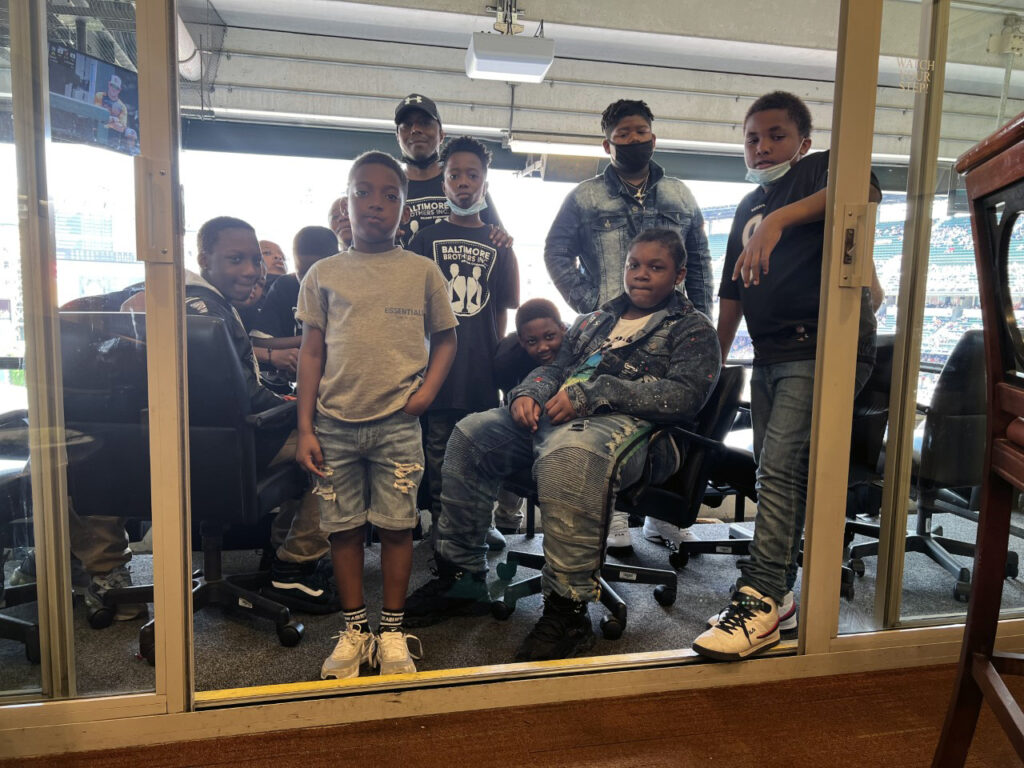
His program collaborates with other fatherhood organizations, community groups, churches, politicians, and individuals who fight every day to uplift fathers.
The mission statement of his program guides his work. It’s goal? “To create a culture where all fathers are actively involved in the parenting process, and who are portrayed and viewed as exemplary role models in society.”
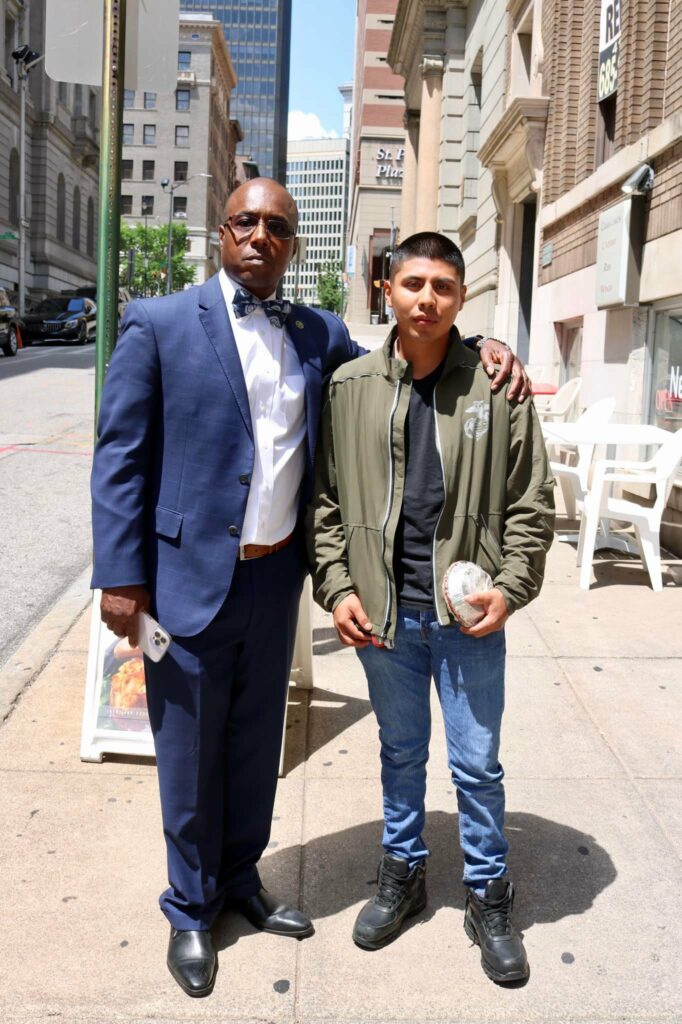
non-profit organization, We Our Us, which
helps young men and boys achieve their goals.
In this June 4 photo, Mr. Muhammad and young
man outside a montlhly community event titled,
“Black Men Unifying Black Men.” Photo: Final X
Matt Prestbury, director of the Black Father’s Foundation in Atlanta, uses modern technology and social media platforms in his work. “In 2008, I looked at the media landscape and saw a little positive portrayal of Black men within it. I also considered how society, on a larger scale, viewed Black men, especially Black men responsible for creating lives,” Mr. Prestbury explained.
“Due to frustration and determination, I created the Facebook group ‘Black Fathers,’ ” he continued.
It was a place for Black dads to share what they go through. “We get upwards of 200 submissions a day. We have probably thousands of comments on those submissions every day. So people are fully engaged,” said Mr. Prestbury.
Mr. Prestbury, who founded the program with his wife Kelly, believes helping Black dads should take a varied approach and offer support to overcome real world challenges. His group offers an Emergency Fund for Fathers and Families, a Fallen Fathers Fund, a Young Fathers Scholarship, and a Storehouse for Essential Items. Alongside that, his group promotes grants, networking and helping fathers create things for themselves. The program’s latest initiative provides financial aid for fathers who attend historically Black colleges and universities, Mr. Prestbury added.
“The thing is, we know who we are. We work every day to provide for our families and we struggle. There are many things we put off and sacrifice for the sake of our kids and our spouses. For me, those are the most important things,” he said.
“We are dedicated, loving fathers, just like anyone else. What makes us so special is that we do it despite all these things against us,” Mr. Prestbury concluded.












